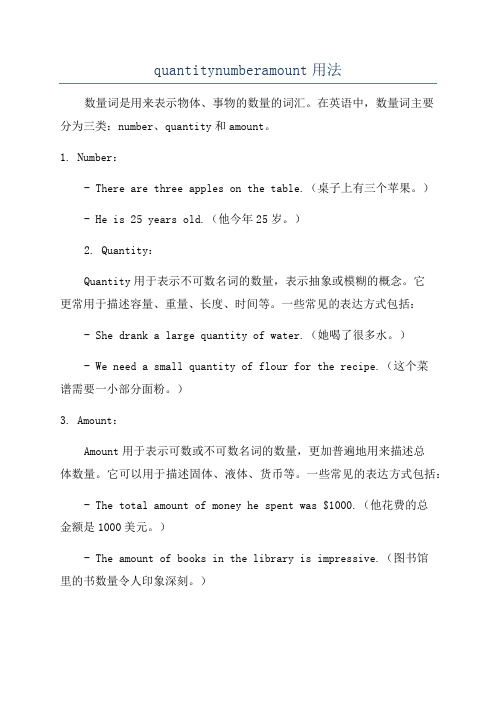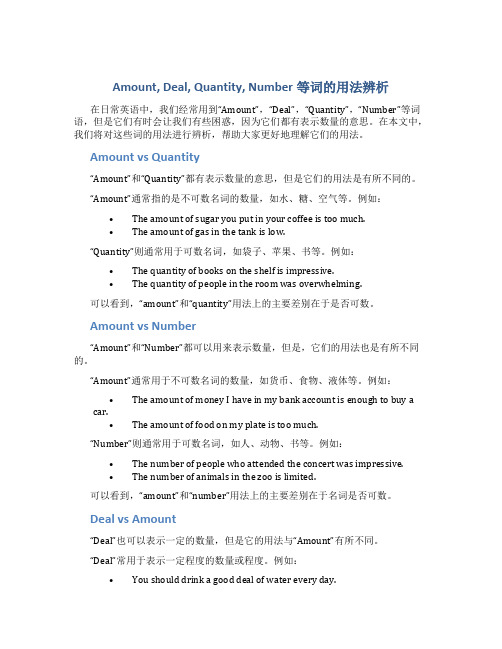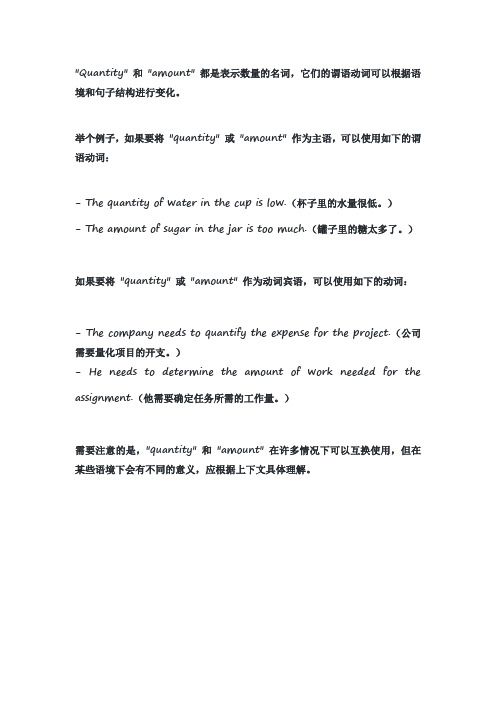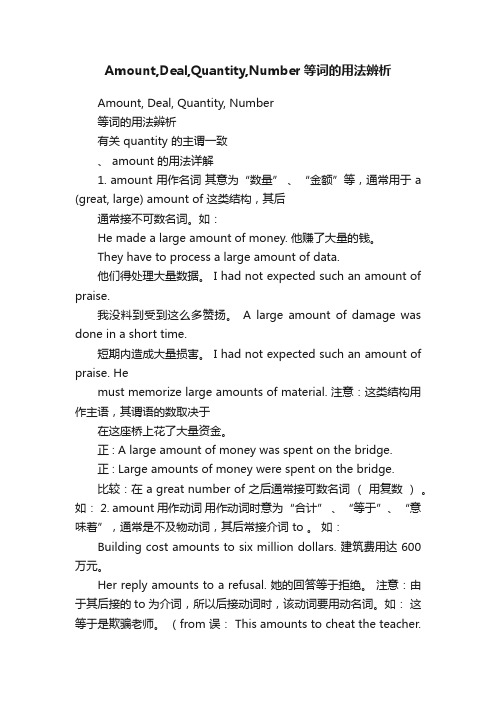Amount, Deal, Quantity, Number等词的用法辨析
quantitynumberamount用法

quantitynumberamount用法数量词是用来表示物体、事物的数量的词汇。
在英语中,数量词主要分为三类:number、quantity和amount。
1. Number:- There are three apples on the table.(桌子上有三个苹果。
)- He is 25 years old.(他今年25岁。
)2. Quantity:Quantity用于表示不可数名词的数量,表示抽象或模糊的概念。
它更常用于描述容量、重量、长度、时间等。
一些常见的表达方式包括:- She drank a large quantity of water.(她喝了很多水。
)- We need a small quantity of flour for the recipe.(这个菜谱需要一小部分面粉。
)3. Amount:Amount用于表示可数或不可数名词的数量,更加普遍地用来描述总体数量。
它可以用于描述固体、液体、货币等。
一些常见的表达方式包括:- The total amount of money he spent was $1000.(他花费的总金额是1000美元。
)- The amount of books in the library is impressive.(图书馆里的书数量令人印象深刻。
)- I need a certain amount of sugar for the recipe.(这个食谱需要一定数量的糖。
)需要注意的是,数量词的具体使用取决于具体的语境和短语。
在一些情况下,这些词汇可以互换使用,但在其他情况下,它们可能有着特定的用法和搭配。
amount的用法总结_amount的用法详解

amount的用法总结在英语学习中,理解单词和弄懂单词用法是非常重要的一步,大家知道amount这个单词吗?知道amount的用法是什么吗?下面是小编给大家带来的amount的用法总结_amount的用法详解,以供大家参考,我们一起来看看吧!关于amount的释义amount n. 数量,数额;总数;(感情、特质的)程度v. 总计,合计;等于,相当于;发展成,变成[ 复数 amounts 过去式 amounted 过去分词 amounted 现在分词 amounting 第三人称单数 amounts ]amount的词语辨析amount, sum, number, quantity这组词都有“总数、总量”的意思,其区别是:amount 普通用词,与quantity近义,但强调整体,指把所有数量、重量及度量归并在一起得出的总数。
sum 普通用词,指简单加算的结果。
number 普通用词,指人或物的数目,强调数的概念。
quantity 书面用词,指事物的总量和总数量,侧重大批计量,含准确测量的意味。
amount的用法总结一.amount用作名词1.amount 用于表示“量”“额”,如重量、金额等。
2.amount of后一般接不可数名词,有时也可接复数可数名词,此名词被视为某一“总量”或“综述”。
The information is of much amount.这情报很重要。
I didn't expect the bill to come to this amount .我没料到账单达到这个金额。
二.amount用作动词1.amount用作动词的基本意思是“合计,共计”,引申可指“等同,接近”。
2.amount是不及物动词,常与介词to连用。
Her answer amounted to a complete refusal.她的答复等于是完全拒绝。
This amounts to doing the whole thing over again.这就等于要把整个事情重做一遍。
amount和quantity主谓一致的用法 -回复

amount和quantity主谓一致的用法-回复主题:Amount和Quantity主谓一致的用法在英语中,主谓一致是语法的重要方面之一。
当我们使用词汇“amount”和“quantity”时,要注意它们与动词的一致性。
本文将一步一步回答有关amount和quantity主谓一致的用法。
第一步:理解amount和quantity的定义首先,我们需要理解amount和quantity的概念。
Amount通常用于表示不可数名词,例如水、时间、金钱等,它们不能被直接数数或量化。
而Quantity则用于可数名词,可以被数数或量化。
第二步:判断主语的数目在确定主谓一致时,我们需要先确定主语的数目。
如果主语是单数,我们使用单数形式的动词;如果主语是复数,我们使用复数形式的动词。
第三步:当主语是amount时当主语为amount时,我们需要根据后面的名词判断主谓一致。
如果后面的名词是不可数名词,则使用单数形式的动词。
例如:- The amount of water in the lake is sufficient for the whole town.(湖中的水量足够供给整个城镇。
)- A large amount of money was spent on the project.(项目上花费了大量的金钱。
)但是,如果amount后面没有名词(即amount作为不定代词使用),则视为复数,使用复数形式的动词。
例如:- A small amount of the students were absent from the class.(少量学生缺席了课堂。
)第四步:当主语是quantity时当主语为quantity时,我们需要根据后面的名词判断主谓一致。
如果后面的名词是可数名词,则使用与名词一致的数量词(例如many, few, several)和复数形式的动词。
例如:- The quantity of books on the shelf is not enough.(书架上的书的数量不够。
quantity和amount的区别用法

quantity和amount的区别用法Quantity和amount都是表示“数量”的名词,但在某些情况下它们有些许不同的用法和含义。
首先,quantity更常用于可数名词,用来表示一个物体或事物的数量。
它通常用于描述不可分割的东西,例如“a quantity of water”(一些水)或“a small quantity of books”(一些书)。
Quantity还可以用于描述人或事物的特性或特征的程度,例如“a large quantity of happiness”(一个很大的幸福感)或“a small quantity of knowledge”(有限的知识)。
另一方面,amount通常用于不可数名词,表示抽象或不可数的事物,例如“an amount of money”(一笔钱)或“a substantial amount of work”(大量的工作)。
Amount常用于描述抽象概念的程度或数量,例如“a large amount of stress”(很大的压力)或“a small amount of patience”(一点耐心)。
此外,amount有时也可以用于可数名词,但通常用于表示可以分割的事物的总和,例如“an amount of apples”(一定数量的苹果)。
但是,用quantity来描述可数名词更为常见,特别是在涉及到完整的个体时。
在某些语境中,quantity和amount可以互换使用,因为它们在某种程度上可以表示同样的概念。
然而,根据上下文和语境,选择正确的词可能会使句子更加准确和自然。
另外,quantity还可以作为动词使用,表示测量或估计某物的数量。
例如,“The scientists are qua ntifying the extent of the damage caused by the earthquake.”(科学家正在测量这次地震造成的破坏程度。
Amount--Deal--Quantity--Number等词的用法辨析

Amount, Deal, Quantity, Number等词的用法辨析在日常英语中,我们经常用到“Amount”,“Deal”,“Quantity”,“Number”等词语,但是它们有时会让我们有些困惑,因为它们都有表示数量的意思。
在本文中,我们将对这些词的用法进行辨析,帮助大家更好地理解它们的用法。
Amount vs Quantity“Amount”和“Quantity”都有表示数量的意思,但是它们的用法是有所不同的。
“Amount”通常指的是不可数名词的数量,如水、糖、空气等。
例如:•The amount of sugar you put in your coffee is too much.•The amount of gas in the tank is low.“Quantity”则通常用于可数名词,如袋子、苹果、书等。
例如:•The quantity of books on the shelf is impressive.•The quantity of people in the room was overwhelming.可以看到,“amount”和“quantity”用法上的主要差别在于是否可数。
Amount vs Number“Amount”和“Number”都可以用来表示数量,但是,它们的用法也是有所不同的。
“Amount”通常用于不可数名词的数量,如货币、食物、液体等。
例如:•The amount of money I have in my bank account is enough to buy a car.•The amount of food on my plate is too much.“Number”则通常用于可数名词,如人、动物、书等。
例如:•The number of people who attended the concert was impressive.•The number of animals in the zoo is limited.可以看到,“amount”和“number”用法上的主要差别在于名词是否可数。
quantity的同义词

quantity的同义词quantity表量,数量; 定量的意思,那么你知道quantity的同义词有哪些吗?接下来小编为大家整理了quantity的同义词,希望对你有帮助哦!quantity的同义词辨析:quantity, amount, number, sum这些名词均有"总数,总量"之意。
quantity :书面用词,指事物的总量和总数量,侧重大批计量,含准确测量的意味。
amount :普通用词,与quantity近义,但强调整体,指把所有数量、重量及度量归并在一起得出的总数。
number :普通用词,指人或物的数目,强调数的概念。
sum :普通用词,指简单加算的结果。
词组习语:any amount of1. 极大量的下半场十分激烈。
the second half produced any amount of action.no amount of1. 即使再多…也不谈得再多也不会有任何改变。
no amount of talk is going to change anything.quantity的例句:1. During fever a large quantity of fluid is lost in perspiration.发烧时,大量水分会通过排汗而丧失。
2. In figure 24 "D" denotes quantity demanded and "S" denotes quantitysupplied.在图24中,D代表需求量而S代表供应量。
3. After some initial problems, acetone was successfully produced in quantity.解决了最初的一些问题之后,终于成功地制造出了大量丙酮。
4. The sheer quantity of detail would bemuse even the most clear-headed author.光是这么多的细节就会让哪怕是头脑最清醒的作者感到困惑。
amount的用法详解

amount的用法详解在英语学习中,“amount”这个单词的用法多样且重要。
接下来,让我们详细了解一下“amount”的各种用法。
“amount”用作名词时,常见释义为“数量;总额;总数”。
例如:“A large amount of money was spent on the project”(这个项目花费了大量的钱。
)这里“a large amount of”表示“大量的”,其后接不可数名词。
需要注意的是,“amount”修饰不可数名词,这是它与“number”的主要区别,“number”修饰可数名词。
“amount”还可以与“in the amount of”这个短语搭配使用,表示“金额为;总数为”。
比如:“The check was in the amount of $500”(这张支票的金额是 500 美元。
)当“amount”用作动词时,意思是“总计;等于;相当于”。
例如:“The expenses amount to $1,000”(费用总计 1000 美元。
)在使用“amount”时,有一些常见的搭配和句型需要注意。
“a small amount of”表示“少量的”,“the total amount”表示“总量”。
此外,“amount”在句中的位置也有一定的规律。
它通常位于主语之后,谓语动词之前。
我们来通过一些例句更好地理解“amount”的用法。
“He has saved a considerable amount of money over the years”(这些年来他存了相当多的钱。
)“The amount of work she does is amazing”(她的工作量之大令人惊叹。
)“The information amounts to very little”(这些信息没什么价值。
)在比较级和最高级的使用上,“amount”也有其特点。
例如:“This year's production amount is larger than that of last year”(今年的产量比去年的大。
quantity amount 谓语动词

"Quantity" 和 "amount" 都是表示数量的名词,它们的谓语动词可以根据语境和句子结构进行变化。
举个例子,如果要将 "quantity" 或 "amount" 作为主语,可以使用如下的谓语动词:
- The quantity of water in the cup is low.(杯子里的水量很低。
)
- The amount of sugar in the jar is too much.(罐子里的糖太多了。
)如果要将 "quantity" 或 "amount" 作为动词宾语,可以使用如下的动词:
- The company needs to quantify the expense for the project.(公司需要量化项目的开支。
)
- He needs to determine the amount of work needed for the assignment.(他需要确定任务所需的工作量。
)
需要注意的是,"quantity" 和 "amount" 在许多情况下可以互换使用,但在某些语境下会有不同的意义,应根据上下文具体理解。
Amount,Deal,Quantity,Number等词的用法辨析

Amount,Deal,Quantity,Number等词的用法辨析Amount, Deal, Quantity, Number等词的用法辨析有关 quantity 的主谓一致、 amount 的用法详解1. amount 用作名词其意为“数量” 、“金额”等,通常用于 a (great, large) amount of 这类结构,其后通常接不可数名词。
如:He made a large amount of money. 他赚了大量的钱。
They have to process a large amount of data.他们得处理大量数据。
I had not expected such an amount of praise.我没料到受到这么多赞扬。
A large amount of damage was done in a short time.短期内造成大量损害。
I had not expected such an amount of praise. Hemust memorize large amounts of material. 注意:这类结构用作主语,其谓语的数取决于在这座桥上花了大量资金。
正 : A large amount of money was spent on the bridge.正 : Large amounts of money were spent on the bridge.比较:在 a great number of 之后通常接可数名词(用复数)。
如: 2. amount 用作动词用作动词时意为“合计” 、“等于”、“意味着”,通常是不及物动词,其后常接介词 to 。
如:Building cost amounts to six million dollars. 建筑费用达 600 万元。
Her reply amounts to a refusal. 她的回答等于拒绝。
number的同义词

number的同义词number表数字; 数量的意思,那么你知道number的同义词有哪些吗?接下来小编为大家整理了number的同义词,希望对你有帮助哦!number的同义词辨析:quantity, amount, number, sum这些名词均有"总数,总量"之意。
quantity :书面用词,指事物的总量和总数量,侧重大批计量,含准确测量的意味。
amount :普通用词,与quantity近义,但强调整体,指把所有数量、重量及度量归并在一起得出的总数。
number :普通用词,指人或物的数目,强调数的概念。
sum :普通用词,指简单加算的结果。
词组习语:any number of1. 任意数量这个游戏可以让任意数量的人参加。
the game can involve any number of players.by numbers1. (逐条)按照指示机械地;死板地机械地画画。
painting by numbers.someone's/thing's days are numbered1. 某人/某物时日无多,持续不了多久我当导演的日子不多了。
my days as director were numbered.do a number on1. (北美,非正式)(尤指故意通过欺骗、羞辱、指责)伤害(某人)have someone's number1. (非正式)了解某人的真实动机(或性格)从而获得优势have someone's number on it1. (非正式)(炸弹、子弹或其他投射武器)注定要击中某人someone's number is up1. (非正式)某人的死期(或劫数)已到without number1. 不计其数他们忘记了那不计其数的信息次数。
they forgot the message times without number.by the numbers1. 按口令:领头者喊口令时统一行动按口令做健美操performing calisthenics by the numbers.2. 机械地:以严格的,一步一步的或机械的方式do a number on&I{【俚语】}1. 彻底地挫败:精心策划和彻底地挫败、使无用或使丢脸get (someone's) number 或 have (someone's) number1. 对某人心中有数:确定或了解某人真正的性格或动机without number 或 beyond number1. 无数的;数不清的无数的蚊子充满了院子Mosquitoes without number filled the yard.number的例句:1. And a number of African countries, too, are slipping through the net.并且一些非洲国家也被漏掉了。
amount和quantity主谓一致的用法

amount和quantity主谓一致的用法一、介绍在英语中,数量词(如a mo un t和qu an ti t y)与主语之间的一致性是非常重要的。
正确使用这些词的一致性,可以使句子更加准确和流畅。
本文将介绍am ou nt和q u an ti ty的用法,并详细解释它们与主语的一致关系。
二、a m o u n t的用法a m ou nt是表示不可数名词的数量词,用来表示无法具体计数或可量化的物质。
以下是a mou n t在句子中的基本用法:1.表示总数a m ou nt可以用来表示总数或总量,后接不可数名词。
例如:-T he am ou nt of wa ter i nt he la ke is de cre a si ng.-H ed ra nk al ar ge amo u nt of co ff ee.2.表示程度a m ou nt还可以表示程度或数量,后接形容词或副词。
例如:-S he pu ta co ns id era b le am ou nt of ef for t in to he rw or k.-T he pr ob le mi so fgr e at am ou nt co nc ern t ot he pu bl ic.三、quantit y的用法q u an ti ty是表示可数名词的数量词,用来表示具体计数或可量化的物体。
以下是qu an ti t y在句子中的基本用法:1.表示具体数量q u an ti ty可以用来表示具体的数量,后接可数名词的复数形式。
例如:-T h eq ua nt it ie so fap p le sa nd or an ge sha v ei nc re as ed at the m ar ke t.-I ne ed to bu yl ar geq u an ti ti es of pa per f or my pr oj ec t.2.表示测量单位q u an ti ty还常用来表示某种测量单位的数量,后接测量单位和不可数名词。
quantity的用法详解及搭配

quantity的用法详解及搭配我们学习英语的时候,就需要理解大量的单词和记住它们的用法,那么大家还记的quantity这个单词吗?知道quantity的用法吗?下面是小编给大家带来的quantity的用法详解及搭配有哪些,以供大家参考,我们一起来看看吧!quantity的词汇辨析quantity,amount,number,sum这些名词均有“总数、总量”之意。
quantity 书面用词,指事物的总量和总数量,侧重大批计量,含准确测量的意味。
amount 普通用词,与quantity近义,但强调整体,指把所有数量、重量及度量归并在一起得出的总数。
number 普通用词,指人或物的数目,强调数的概念。
sum 普通用词,指简单加算的结果。
▼quantity的用法详解1. quantity表示“数量”时,如果是指相对于质量来说的“数量”,则为不可数名词。
例句:We've always put quality before quantity.我们总是认为质量比数量重要。
2. quantity如果指具体的数量,一般为可数名词,这时可以连用不定冠词或者用复数形式;如果要表示数量的多少,则可以用great, large, huge或者small 等形容词修饰;quantity既可以用于修饰不可数名词,也可以用于修饰复数名词。
例句:He ate a small quantity of rice.他吃了少量的米饭。
Don't strive merely for quantity of production.在生产中不要单纯地追求数量。
注意事项:在某些特殊表达中,quantity可单独表示“大量”(没有large或者great之类的修饰语)的意思。
例句:Heavy drinking can reduce the quality and quantity of sperm.大量饮酒会降低精子的质量和数量。
amount number的用法和区别

amount number的用法和区别
amount和number都可以表示数量,但在使用时有所不同。
1. amount通常用于不可数名词,如money、water、time等,表示“总量、总数、总共”的意思。
例如:
- I have a large amount of work to do. 我有很多工作要做。
- We need to reduce the amount of waste we produce. 我们需要减少我们产生的废物总量。
2. number通常用于可数名词,如books、students、cars等,表示“数量、数目”的意思。
例如:
- The number of students in our class is 30. 我们班的学生人数是30人。
- I have a large number of books in my room. 我房间里有很多书。
注意:有些名词既可以是可数又可以是不可数,这时要根据具体情况来判断使用哪个词。
例如:
- The amount of sugar in the jar is too much. (不可数) - I bought a number of books at the bookstore. (可数) 总的来说,amount更多用于不可数名词,而number更多用于可数名词,但也不是绝对的。
在具体应用中,要根据语境和用法来确定使用哪个词。
- 1 -。
amount的用法

amount的⽤法
amount⽤作名词时,表⽰⾦额、数额等含义;⽤作动词时,通常⽤作不及物动词,表⽰相当于,等同,合计等含义。
⼀.amount⽤作名词
1.amount ⽤于表⽰“量”“额”,如重量、⾦额等。
2.amount of后⼀般接不可数名词,有时也可接复数可数名词,此名词被视为某⼀“总量”或“综述”。
The information is of much amount.
这情报很重要。
I didn't expect the bill to come to this amount .
我没料到账单达到这个⾦额。
⼆.amount⽤作动词
1.amount⽤作动词的基本意思是“合计,共计”,引申可指“等同,接近”。
2.amount是不及物动词,常与介词to连⽤。
Her answer amounted to a complete refusal.
她的答复等于是完全拒绝。
This amounts to doing the whole thing over again.
这就等于要把整个事情重做⼀遍。
和amount用法一样的单词

和amount用法一样的单词在英语中,amount是一个非常常用的单词,它表示数量、金额等。
除了amount之外,还有很多单词和它用法相似,下面就来介绍一下这些单词。
1. measuremeasure是一个常用的单词,它表示量度、测量、措施等。
它也可以用来表示数量、程度等,和amount用法相似。
例如:The amount of water in the tank measures 10 liters.(这个水箱里的水量为10升。
)2. numbernumber表示数量、数字、编号等,和amount用法相似。
例如:The number of students in the class is 30.(这个班的学生人数是30人。
)此外,number还可以用来表示事物的排行、名次等。
3. levellevel表示程度、级别、等级等,也可以用来表示数量。
例如:The level of milk in the bottle is very high.(瓶子里牛奶的浓度很高。
)4. quantityquantity表示数量、物质量的大小,和amount用法相似。
例如:The quantity of goods in the warehouse is very large.(仓库里的货物数量很大。
)5. scalescale表示规模、比例尺、尺度等,也可以用来表示数量。
例如:The company's sales scale has doubled this year.(公司的销售额今年翻了一番。
)除了以上提到的单词之外,还有很多其他单词和amount用法相似,例如:size、number、capacity、value等。
这些单词都可以用来表示数量、金额等概念。
在使用这些单词时,需要注意它们的用法和含义,避免混淆。
同时,也要注意它们的搭配和语境,以便更好地表达意思。
另外,在使用这些单词时,还需要注意一些常见的用法错误。
amount的用法

amount的用法一. 什么是"amount"和它的基本用法?"Amount" 是一个英语单词,常用于表示数量或总数。
它是一个可数名词,可以指代具体的事物、抽象概念或金钱等。
在语法上,"amount" 通常不与不定冠词"a/an"搭配使用,而是直接作为主语或宾语出现在句子中。
1. 表示具体数量:当我们需要描述一个可数名词的总数时,可以用“amount”加上相应的名词形式。
例如:- The amount of books on the shelf is impressive.(书架上的书量很惊人。
)- Can you tell me the amount of money in your bank account? (你能告诉我你银行账户里的金额吗?)2. 表示抽象程度:"Amount" 还可以用来描述抽象概念或程度的多少。
这时通常与 "of" 连用,并跟随着相应的抽象名词。
例如:- There is a certain amount of truth in what he said.(他所说的有一定程度的真实性。
)- A large amount of effort was put into organizing the event.(大量努力被投入到了组织这个活动中)3. 表示未知或不确定数量:在某些情况下,我们并不关心具体的数量,而只是表示一个未知或不确定的数量范围。
这时可以使用 "amount of" 加上不定代词或名词。
例如:- There is an unknown amount of water leakage in the building.(大楼里有一定量的水泄漏,具体数量未知)- A significant amount of people attended the conference. (参加会议的人数相当可观,具体人数不详)二. "Amount"与其他类似单词的区别在英语中,还有一些与 "amount" 含义类似的单词,如 "number"、"quantity" 和"total"。
amount的用法总结

amount的用法总结一、amount的定义和基本用法amount是一个常见的英语名词,也可以作为动词使用。
作为名词时,它表示数量或总数;作为动词时,它表示达到或合计。
1. 名词用法名词“amount”通常用来指涉事物的数量或程度,例如:“The amount of sugar in this recipe is too much”(这个食谱中的糖量太多了)。
在这个例子中,“amount”被用来描述食谱中糖的数量。
另外,“amount”还可以用来提及金额、数字等与数量相关的东西。
2. 动词用法当“amount”作为一个动词时,它意味着某物达到或积累到某一程度。
“Amount”常与介系词“to”连用,表示达到某个状态。
例如:“His hard work amounted to success”(他辛勤工作最终获得了成功)。
这里,“amounted to”的意思是“转化为”。
二、基于不同场景下的具体应用1. 数量描述在日常生活中,我们经常使用“amount”来描述不可数名词或难以精确计算数量的事物。
如:a) “The amount of rain we received last month was higher than usual.” (上个月我们收到的雨水量比平常要多)b) “She spends a vast amount of time studying for her exams.”(她花了大量时间备考)2. 金融领域在金融领域,“amount”通常用来描述资金的总数。
例如:a) “The total amount of the loan is $10,000.”(贷款总额为10000美元)b) “Please transfer the amount to my bank account.”(请将金额转账到我的银行账户)3. 商业运营在商业运营中,我们可以用“amount”来指代订单的总额、销售量、库存量等。
amount的用法详解

amount的用法详解《amount 的用法详解》在英语学习中,“amount”这个词的使用频率较高,但其用法却有一些需要我们特别注意的地方。
接下来,就让我们详细地了解一下“amount”的用法。
“amount”用作名词时,常见的意思是“数量;总额;总数”。
例如:“A large amount of money was spent on the project”(这个项目花费了大量的钱。
)这里“a large amount of”表示“大量的”,其后通常接不可数名词。
需要注意的是,“amount”在表示“数量”时,侧重于表示整体的总量。
与“amount”搭配的常见短语有“a small amount of”(少量的)、“a certain amount of”(一定量的)等。
例如:“She has only a small amountof time to finish the work”(她只有少量的时间来完成这项工作。
)“There is a certain amount of risk involved”(这涉及到一定量的风险。
)“amount”用作动词时,意思是“总计;等于;相当于”。
例如:“The cost amounts to $500”(费用总计 500 美元。
)“His words amount to a refusal”(他的话相当于拒绝。
)在使用“amount”时,有几个容易混淆的点需要我们留意。
首先是它与“number”的区别。
“number”主要用于可数名词,表示“数目;数字”;而“amount”主要用于不可数名词,表示“数量;总额”。
例如:“A number of students ar e playing on the playground”(许多学生正在操场上玩。
)“A large amount of water is needed for the experiment”(这个实验需要大量的水。
quantity和amount的区别用法

quantity和amount的区别用法摘要:1.引言:介绍quantity和amount的区别2.定义和含义:解释两个词的基本含义和用途3.用法差异:详细说明在何种情况下使用quantity,何种情况下使用amount4.实例说明:通过具体实例展示两者的用法5.总结:强调在学习过程中注意区分和使用这两个词正文:【引言】在学习英语的过程中,我们经常会遇到两个表示“数量”的词汇:quantity和amount。
尽管它们在某些情况下可以互换使用,但它们之间还是存在一定的差异。
为了更好地理解这两个词,我们需要了解它们的基本含义和用法。
【定义和含义】首先,我们来了解一下这两个词的基本含义。
quantity指的是数量、批量或规模,通常用于表示可数或不可数名词的数量。
而amount指的是总额、总数或总数量,通常用于表示金钱、物质或抽象概念的数量。
从含义上看,quantity更侧重于具体数量的描述,而amount则更强调总量的概念。
【用法差异】在实际应用中,quantity和amount有以下差异:1.当表示具体数量时,我们通常使用quantity。
例如:“There is a large quantity of apples in the basket.(篮子里有很多苹果。
)”2.当表示金钱、物质或抽象概念的数量时,我们通常使用amount。
例如:“I deposited an amount of money in the bank.(我在银行存了一笔钱。
)”3.在表示度量、衡量或计数时,我们通常使用quantity。
例如:“The quantity of goods imported increased by 10%.(进口商品的数量增长了10%)”4.在表示总体、总和或全体时,我们通常使用amount。
例如:“The amount of money spent on education has increased.(教育支出总额已经增加。
- 1、下载文档前请自行甄别文档内容的完整性,平台不提供额外的编辑、内容补充、找答案等附加服务。
- 2、"仅部分预览"的文档,不可在线预览部分如存在完整性等问题,可反馈申请退款(可完整预览的文档不适用该条件!)。
- 3、如文档侵犯您的权益,请联系客服反馈,我们会尽快为您处理(人工客服工作时间:9:00-18:30)。
Amount, Deal, Quantity, Number等词的用法辨析有关quantity的主谓一致一、amount的用法详解1. amount用作名词其意为“数量”、“金额”等,通常用于 a (great, large) amount of 这类结构,其后通常接不可数名词。
如:He made a large amount of money. 他赚了大量的钱。
They have to process a large amount of data. 他们得处理大量数据。
I had not expected such an amount of praise. 我没料到受到这么多赞扬。
A large amount of damage was done in a short time. 短期内造成大量损害。
I had not expected such an amount of praise. 我没料想受到这样多的赞扬。
He must memorize large amounts of material. 他必须背熟大量材料。
注意:这类结构用作主语,其谓语的数取决于 amount 的数。
如:在这座桥上花了大量资金。
正: A large amount of money was spent on the bridge.正: Large amounts of money were spent on the bridge.比较:在 a great number of 之后通常接可数名词(用复数)。
如:2. amount用作动词用作动词时意为“合计”、“等于”、“意味着”,通常是不及物动词,其后常接介词 to。
如:Building cost amounts to six million dollars. 建筑费用达600 万元。
Her reply amounts to a refusal. 她的回答等于拒绝。
注意:由于其后接的to为介词,所以后接动词时,该动词要用动名词。
如:这等于是欺骗老师。
(from 误:This amounts to cheat the teacher.正:This amounts to cheating the teacher.析:amount 用作动词,表示“等于”,是不及物动词,其后接的to 为介词。
二、a great/good many 非常多,许多(形容词)The young couple has travelled a great many cities since they got married.A great many college students were sent to the West to help the children there.Helen has a great many friends indeed, but she does not think she has any she can confide in.The city was even equipped with a drainage system, for a great many clay pipes were found beneath the narrow streets.He has extracted a great many examples from the grammar book.比较:1. many a... 许多(后接单数动词)Many a teacher has come to the exhibition.Many a woman has great influence on her husband.He beguiled us with many a tale of adventure.2. a lot, lots of, a number of 与 a great many / a good many 意义相同。
三、a great deal 大量地,非常多的1、作副词The old woman's life is a great deal better now.2、作代词1. We have learnt a great deal from our professor.2. I have accomplished a great deal in the last few months.3. We waited for their decision with a great deal of apprehension.2、作名词(不可数)1. People spend a great deal of money on National Day.2. He drinks a great deal of water every day.3. He offered me a great deal of money.4. Keeping the house really meant a good deal to me.3、比较:a lot of, lots of 也表示“非常多”,但它既可接可数名词,也可接不可数名词。
There is a lot of rain here in summer.There are lots of tourists in Beijing every year.A glossy magazine has lots of pictures of fashionable clothes and is printed on good quality paper.He is a bold thinker, with lots of original ideas.4、比较:a big deal 重要人物[a subject, situation, or event which people think is important. ]1)I don't know why this issue has become such a big deal.2)Losing the match was no big deal.3)All I said was, I'm going to have a baby - what's the big deal4)Yes, it's his birthday today, but he doesn't want to make a big deal of it. (= make people notice it by having a special celebration)四、a handful of 一把,少量(作为量词)1. She scooped up a handful of snow and rolled it into a ball.2. Only a handful people agree with him, it is a foolis risk.3. We invited twenty people, but only a handful of them came.picked up a handful of letters and began to open them.比较:同义词组有:a small amount of , a small number ofA cap or tube containing a small amount of explosive used to detonate the main explosive charge of a firearm or mine.At this school, only ten people passed the music examination this year. That may seem a small number but it's(about) par for the course.四、a kind of 有点儿,几分,一种An apple is a kind of fruit.Money is a kind of allurement for us.I have a kind of feeling this might happen. (隐约觉得)I have a kind of suspicion that she told a lie. (有点儿)比较:1. all kinds of / all sorts of 各种各样的Donations came from all kinds of people.All kinds of remarkable thigns began to happen.2. of a kind 同类的,(质量)低劣的There is good news of a kind for Mr. Zhang.She finds solace of a kind in alcohol.六、小结1.只加可数的复数manya great/good manya (large/good) number of复数谓语2.+不可数名词mucha great deal ofan amount of=amounts of单数谓语3.+不可数名词/可数的复数a lot of /lots ofplenty of (前不加a)谓语由所修饰名词定a +单数可数名词,单数谓语large quantity of加不可数名词/可数的复数 ,单数谓语quantities of 加不可数名词/可数的复数 ,复数谓语六、Large quantities of 的用法主谓一致我们已经详细复习过,它是高考英语考试的重要考点之一,其中不乏难题,尤其是带有限定词的名词短语作主语时,最难选择谓语的单复数形式。
例如,“a quantity of +名词”作主语时,谓语是用单数还是用复数就让广大考生困惑不已,到底是用单数还是用复数呢且看下文:1、A (large) quantity of 修饰可数或不可数名词,谓语动词用单数。
Large quantities of money have been sent there.A large quantity of books has been offered to us.A large quantity of people is needed here.2、(large) quantities of修饰可数或不可数名词,谓语动词用复数。
